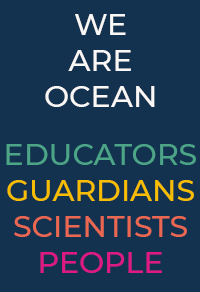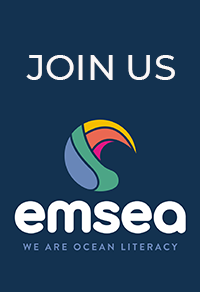Incredible Oceans: ocean literacy the fun way
If you want to have a laugh, you interview Russell Arnott: oceanographer, marine biologist, scientific researcher, educational consultant, science communicator, presenter and author. But above all: humorous, passionate, both optimistic and feet on the ground. He has the amazing skill of intertwining humour into the most depressing stories about ocean health.
As a kid he felt “all the best animals were in the sea”. From an early age he was drawn to whales, squids and anglerfish and yet he started a Fine Art degree. It was only after seeing a poster on the tube in London, stating only 2% of our ocean was already explored, he found his real calling and ended up doing a Master in Oceanography in Southampton. Today he has a PhD in marine biology and is the director of Incredible Oceans.

Incredible Oceans
You can find the Incredible Oceans team at music festivals or community events, most often in a giant, inflatable dome, covered with illustrations of the most mesmerising ocean creatures. In the dome is a table full of marine artefacts: an orca skull, pieces of baleen, shark jaws and 3D printed megalodon teeth. Many of these artefacts are linked with a creature on the dome, illustrating the stories Russell and his team tell to visitors.
There is also a science experiment area, where people can join in an ocean acidification experiment or make a salt water battery. In the dome people can play games. There is one about the lifecycle of plastic, that sparks conversation about so-called green or eco plastics, how we use plastic and how long it takes to biodegrade. The mix ‘n match activity on ocean acidification helps people understand a difficult, abstract concept by visualising the real-life impacts on different sea creatures.

The team also organises workshops to engage people that would otherwise not visit the dome. With his background in arts, Russell gives still life drawing workshops, where he puts an orca skull in the middle of the table and then coaches people through how to draw it, while talking about orca evolution, behaviour and anatomy. Incredible Oceans co-director Claudia Allen gives ‘underwater Pilates’ workshops, guided by a script about comparative anatomy between humans and whales and what would happen with our bodies under water.
The most successful event to Russell was probably a weekend with the dome in the shopping centre of Bradford, as part of the Bradford Science Festival. ‘In shopping centres, you meet all kinds of people, not only the ones interested in science. You probably can have the biggest impact in these unexpected locations. It was nice hearing all these adults being enthusiast and shouting ‘I had no idea!’, he says.

The team also visits schools, making the students enthusiast about the ocean during engaging lectures and workshops, e.g. by dissecting fish, letting them handle an imaginary oil-spill cleanup or a hands-on experiment about ocean plastic. They also offer plenty of both informative and funny videos that can be used in the classroom, as well as webinars for teachers.
Whether at schools or festivals: the Incredible Ocean style is a unique one. Sometimes even dressed up as a pirate or a mermaid, they make science accessible and fun. Even though every single Incredible Ocean colleague is highly qualified in marine science and conservation, none of them matches the image of scientists in an ivory tower. Adding humour and entertainment brings the audience closer and makes science much more accessible to a broader public, Russell believes.

Training for scientists and specialists
Targeting the ‘big audience’ is not the only goal of Incredible Oceans. They offer training for scientists and specialists as well. ‘Science communication is incredibly important,’ Russell says, ‘but many scientists are afraid of e.g. speaking for schools.’ Just as anything in life, science communication is a skill that can be taught. ‘All through their career, scientists have learned to keep themselves out of their investigation and reporting on it in a very formal way. They don’t say ‘I heated the test tubes’, they say ‘the test tubes were heated at 200°C’ as if they were not there. If you talk to people, you need to put yourself out there, otherwise it’s not relatable for your audience. To engage people, you need to bring a story, you need to tell them about your passion and dreams for the future. You need to say why you do this research and why it is important to you. Scientists need to stop being so formal and start being more human.’
Russell believes scientists not only have a responsibility to research and report about it, but to engage people around a subject and activate them as well. ‘It would be hypocrite to research the impacts of climate change and then don’t raise the flag. As a scientist, you can make a difference. You can make people listen to you. Not everyone likes listening to a protester who’s going to ‘bring down the system’ but they might listen to someone who’s an expert in his field and clearly communicates his findings. And I believe it’s our obligation to do so.’
Incredible Oceans guides scientists in this process through trainings in media representation, press interviews, video creation, pitching sessions and storytelling.

Things to pay attention to in (marine) science communication
Something many scientists tend to do, is dumb things down, especially for an audience of children or teenagers. ‘There’s no need for doing that’, warns Russell. ‘We don’t need to dumb the science down, we need to build it up. People get annoyed and switch off when you use big words you don’t contextualise. But if you build up to it and explain where the words come from, they get engaged. People want to learn, they want to show off their knowledge at the bar and impress their friends. Even the youngest kids can use big words. Look at how many dinosaurs a random 4-year-old can name!’. To Russell, carefully explaining things and making them recognisable with close-to-home examples or comparisons is the way to go.

Another important factor in science communication is optimism. When writing the book ‘Ocean Endangered’, he wasn’t going to sugarcoat things, but he also stayed clear from a depressing and pessimistic tone. ‘My co-author Celine Van Weelden and I had this approach in our book where we sandwich the bad news in between good news. We started each chapter about a specific biome with all the cool stuff you can find there, then talked about the problems that affect that biome and ended with possible solutions and what is already being done to minimise the negative effects.’ It’s a good way of informing people of the current biodiversity crisis, while still offering hope for the future and engaging them in participating.
Russell also calls for more diversity within marine conservation in order to appeal to different audiences. ‘One of the reasons the sector is so white and middle-class, is the big emphasis on unpaid internships and volunteering. This puts barriers in place for many people. Either you need to have enough funds to support yourself through that unpaid internship, or you can’t have any caring responsibilities in order to be able to juggle both an unpaid internship and a paid job.’ Russell stresses the sector can gain a lot from allowing it to become more diverse and include people with different backgrounds.

Russell’s biggest dream is to put himself out of a job because the world no longer needs to be told that the ocean is important. Until then, he keeps going, spreading his joyful and quirky approach to science.
Top tips for Ocean Literacy organisations by Russell Arnott
‘I think we need more self-awareness. We need to reflect on who we are and how we come across to other people. We need to be aware of the language we use and the assumptions our audience makes about us.’
‘We shouldn’t be afraid to fail. It’s easy to do safe things, like going to ocean conferences and targeting people who are already interested. However, it’s important to try new things and push the envelope, to try to engage with new communities. That’s not always going to be successful, but you need to try to know what works, what doesn’t and how you can improve yourself as a communicator or practitioner. We only celebrate and share our success, but there is a lot to learn from failure and from sharing things than don’t work.’
Text by Anke de Sagher for EMSEA
Photos by Russell Arnott & Incredible Oceans, Joe Higham (photo SciComm training courses), Benjamin Loveday (photos Plymouth Pirates weekend)


